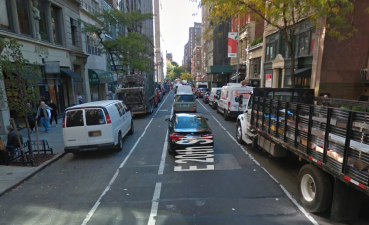Will New Yorkers Get Doored by de Blasio’s Taxi of Tomorrow Opposition?
As Mayor de Blasio weighs the potential $100 million cost of converting his opposition to the Taxi of Tomorrow into official city policy, New Yorkers on two wheels should remember one key feature of the Nissan NV200 selected as the city’s next taxi: It will all but eliminate the possibility of getting doored by an exiting taxi passenger.

The vehicle has sliding doors for backseat passengers, reducing the need for Taxi TV public service announcements reminding passengers not to whip open their doors into the path of a passing cyclist — something that’s not just dangerous, but also against the law.
That improvement and others, including built-in GPS for drivers, rear-side lights to indicate when passengers are entering or exiting, a front-end design that reduces the severity of crashes with pedestrians, “lower-annoyance” horns, and rear cameras drivers can use while backing up, would be lost if the mayor decides to scrap the design.
On Tuesday, a state appeals court reversed a lower court ruling against the city’s Taxi of Tomorrow plan. The case could be appealed to the state’s highest court, and de Blasio said on Wednesday that, although the city’s law department continues to defend the project, he is opposed to it:
I think it is not right to have a single vehicle approved instead of a variety of vehicles that meet certain standards. I don’t like that we’ve lost an opportunity to create jobs here in New York City. I don’t like Nissan’s involvement in Iran. I don’t like a lot of things about this. I think it was a broken process on many levels.
Other criticisms of the Nissan vehicle are that it is not a hybrid and it is not wheelchair-accessible by default. London, which has also selected the NV200 as its new taxi, will have a fully-accessible fleet. A modified accessible version will be made available in New York.
Today, Capital New York reported that if the city ends up switching sides and backs out of the Taxi of Tomorrow plan, the city’s contract with Nissan stipulates that it could be on the hook for at least $100 million in costs the carmaker has incurred in designing and producing the vehicle.
De Blasio, who received significant campaign contributions from yellow taxi interests during his campaign, vigorously opposed both the Taxi of Tomorrow and the Boro Taxi program. Under his watch, TLC has continued to roll out the Boro Taxi plan, though on a slightly slower schedule.
“We are looking at what possible changes could be made to the program,” TLC chair Meera Joshi said in a statement about the Taxi of Tomorrow to Capital New York. “But at this stage, it is premature to assess those options until we have final clarity on the legal situation.”
